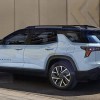
Audi Charging Hubs: Hopefully, These Will Make It to the U.S.
EVs are not only getting more popular—they’re becoming a requirement in some places. New York, for example, has decided to ban all gas-powered cars by 2035. Entire countries have taken similar motions. Japan is banning gas-powered cars by 2030, while Norway is banning them by 2025.
Of course, given all these EVs that will be on the road, more charging stations and other EV infrastructure will also be needed. That’s where Audi comes in. The company has started building high-tech charging hubs that have received overwhelmingly positive feedback.
What are Audi charging hubs, and where are they located?

According to Audi, the charging hubs are simple in premise. Like every charging station, they give you a place to charge your EV. One unique thing about them is that they use energy stored in cubes that can be assembled and disassembled. Moreover, the company designed them to be sustainable. The batteries are recycled from test vehicles, and the power comes from green and clean energy sources like solar power.
According to CarBuzz, as of now, there is only one Audi charging hub which opened in December 2021 in Nuremberg, Germany. In the latter half of 2022, Audi plans to open more locations across multiple cities in Germany. From there, they will continue to expand across the country in 2023 and 2024.
Currently, there is no information on whether they will expand outside Germany.
What’s all the buzz about Audi charging hubs?
Besides the focus on clean energy, the Audi charging hub in Nuremberg has received praise for its unique amenities.
The fast-charging station is connected to a lounge, where customers can work or relax while waiting for their vehicle to charge. According to Audi, it takes around 20 to 30 minutes to get a vehicle to 80% battery level.
If someone wants to stay to get it 100% charged, though, most can stand to wait a little longer. Audi charging hubs offer a patio, charging points for devices, a food delivery service, test drives of some Audi vehicles, electric bike battery exchanges, and even electric scooter rentals.
While this sounds luxurious, Audi aims to keep their prices affordable. Those with an e-tron Charging Service contract can charge their vehicles at a flat rate of 0.31 euros per kWh (0.33 USD). The e-tron Charging Service is a subscription granting access to all Audi charging points.
Issues with EV infrastructure continue.
As exciting as this development is for Germany, the world continues to suffer from a lack of EV infrastructure. Range anxiety is still dominating the conversation, just as it was when most EVs could barely go 300 miles. In the U.S., this doesn’t affect urban areas nearly as much as rural ones. Sparsely populated Western states like Wyoming and Nebraska usually require long drives to get from one destination to another.
Of course, this is without considering individual circumstances, like workers who have long commutes to work or those who enjoy traveling. For certain people, getting an EV just isn’t a viable option right now. Most can’t just turn their entire lifestyle around for one vehicle, even given all the benefits it comes with.
While companies are making some progress — non-Tesla vehicles work at Tesla charging stations, for example — there is still much work to be done before EVs can eclipse gas-powered vehicles. We can only hope Audi’s developments will come over to the U.S. and bring some much-needed infrastructural updates.


